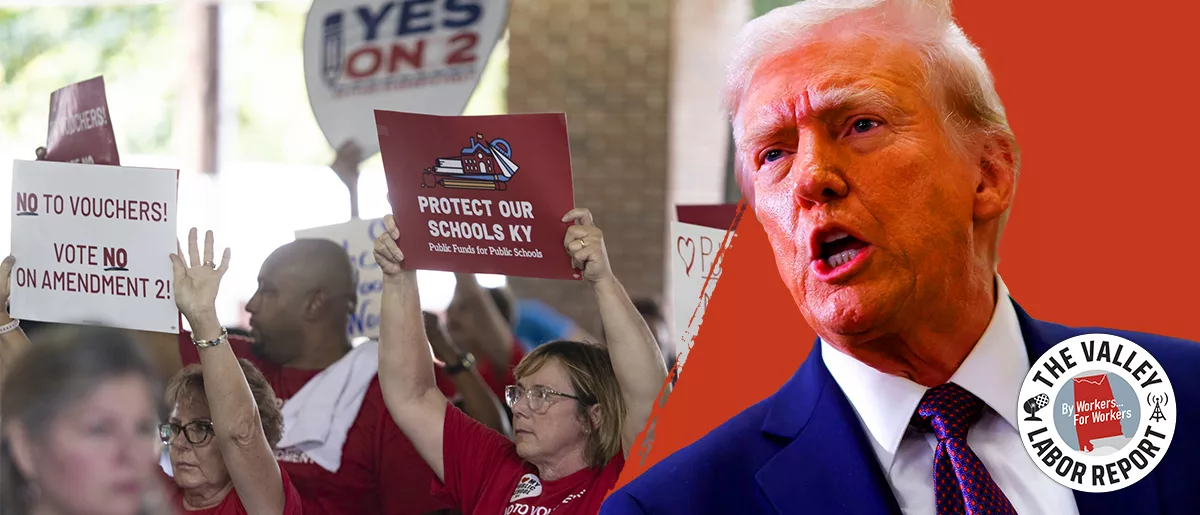“[In] the public education fight right now, because the Right is being so ambitious about one of their most controversial proposals, it’s an opportunity, I think, because they’re overreaching on an extremely unpopular policy.”
Jason Bailey is just one among a majority of Kentuckians celebrating the recent defeat of a Republican-backed bill in the state that would have introduced a school voucher program — a move Republican lawmakers across the United States have been aggressively pushing for in recent years. Bailey is not only celebrating, but was also directly part of a statewide campaign to alert the public about the bill and what it would mean materially for them and their children.
“We had a very clear message that [private school vouchers] would take money away from the public schools that serve ninety percent of Kentucky children and divert those dollars to unaccountable private schools that serve the few.”
Bailey is the Executive Director of the Kentucky Center for Economic Policy and was instrumental in the defeat of Amendment 2 (A2), also known as the “Voucher Amendment.” He joined us on The Valley Labor Report earlier this month to talk about the strategy he and his group used, as well as how this fight came about to begin with in Kentucky.
According to Bailey, the Republicans’ strategy across the country has been to start small and build up from there, in an attempt to keep it largely under the radar. And this was precisely the strategy used in Kentucky, explains Bailey, referring to a bill that was initially passed that introduced private school vouchers through the tax code. But as it turns out, this was a violation of Kentucky’s own constitution.
“We worked with partners to sue and our state supreme court actually struck it down because it turns out Kentucky in 1891 put in a pretty strong prohibition against public money for private schools in our constitution. And so the court unanimously struck it down.”
But this was by no means the end of the push for private school vouchers by Kentucky’s Republican super-majority legislature. Undeterred, their next step was to put it on the November 2024 ballot. According to Bailey, this particular proposal would have pushed it even further.
“The proposal would not only allow a blank check to the legislature for any amount of spending on private school vouchers, but it would overturn completely the constitutional commitment to an adequately and equitably funded public school system. So it was a tremendous threat.”
This was where Bailey and his team really had to step up, to help spread the word around the state about what this proposed amendment would do, what it would mean for them, their schools, and their kids.
One of the strategies that would become integral to the success of this opposition was to have people from various local communities on the team who could be trained to act as delegates to their communities, where they would be recognized by neighbors, friends, and family, as opposed to having a stranger try to convince them.
“[W]e recruited and trained local messengers; people that folks knew in their communities and could talk authentically about the local impacts,” Bailey explained.
It was imperative to show the public what exactly was at stake.
“We helped people understand that this was yet another thing that you’re going to lose in communities that have already lost so much, in terms of jobs, in terms of people moving away, and here’s something else they are coming after: they’re coming after your school.”
This campaign turned out to be a major success when a majority of Kentuckians (65%) voted down the proposed amendment in November. In fact, every single county in the state voted against it.
For Bailey, among many others in the state, this was a tremendous sigh of relief. But he knows all too well that this is not the end of the fight.
“You’re seeing the Right Wing become much more aggressive about one of their biggest goals, which is to privatize public education, that’s one of their most ambitious goals, I think it goes right up there with Social Security,” he said. “There are twelve states, I believe, in the last two years that have enacted universal voucher programs. And that wasn’t something that anyone thought was possible 20 years ago, 30 years ago.”
Watch the full interview with Jason Bailey.
